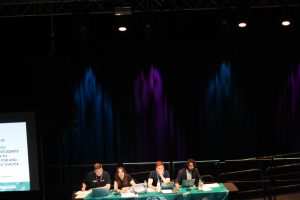On November 13th it was announced that Cardiff University researchers had won the 2013 Lush Science Prize in recognition of their success in finding alternatives to the controversial method of animal testing.
Established in 2012, the Lush Prize is part of a major enterprise that aims to make the use of animal subjects in substance testing obsolete. Cardiff secured the honour over a host of institutions intenerationally, making their achievements all the more impressive.Cardiff were joint winners with Liverpool University for the honour and both institutions received an award of £25,000.
The prize was awarded to the Lung and Particle Research Group at the University. Their pioneering work employed the model of a lung using human tissue, which was able to show cellular damage and changes in metabolic activity as a response to toxins. This model has been confirmed to be a practical alternative to the use of animal test subjects for cosmetic products, pesticides and foodstuffs.
Dr Kelly BÈRubÈ, Director of the Lung and Particle Research Group at Cardiff University said, ìWeíve found that using human tissue produces far more robust results than animal models. Weíre now able to predict with very high accuracy what will happen in a human lung. Weíre very excited about this work ñ and we want to encourage everyone to use human tissue systems.î
The prize was awarded as part of the ëFighting Animal Testingí campaign backed by the international organisations  Lush and the Ethical Consumer Research Association. Lush is a retailer of fresh handmade cosmetics with shops in 49 countries and are well-known campaigners against animal tesing. The Ethical Consumer Research Association is a UK-based research and consultancy co-operative focused on working with companies and consumers  around active
ethical choices.
Cardiff University have been heavily criticised for the use of animals in their research in previous years. Statistics have revealed that animal testing at Cardiff has been increasing over the last eight years. In 2010, Cardiff used 45, 591 animals, compared to 61,181 in 2012, an increase of more than 15,000 in 2 years.
Last year, researchers at Cardiff University caused controversy by conducting experiements in which kittens had their eyelids sewn shut and litters were raised in darkness. The researchers defended the experiments, arguing they were aimed at developing treatments for the human condition of Amblyopia, commonly termed ëlazy eyeí.
Such stories appear to have motivated the Lush-backed campaign. On the Lush Prize website the organisation have cited the prolonged suffering and unreliable results of such experiments as reasons for ending animal testing. Emphasis is placed on the difference  in lifespan, size, physiology and biochemistry between subjects which affect the toxicity results of test substances.
Such campaigns help raise awareness of the ethical concerns that animal testing causes.  Many researchers who carry out testing on animals do however acknowledge that experiments should be made as humane as possible.
Max Eshraghi
News Editor







Add Comment